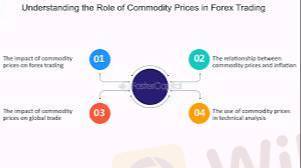
2025-02-13 05:40
SettoreThe Role of commodity prices in forex trends
Commodity prices play a crucial role in influencing forex (foreign exchange) trends because they impact the economic performance of countries that are major exporters or importers of specific commodities. Here’s how commodity prices affect forex markets:
1. Impact on Commodity-Exporting Countries
Countries that rely heavily on exporting commodities (e.g., oil, gold, agricultural products) see their currency strengthen when commodity prices rise.
For example, when oil prices increase, oil-exporting countries like Canada (CAD), Russia (RUB), and Norway (NOK) often experience currency appreciation.
A decline in commodity prices weakens these currencies as export revenues drop.
2. Impact on Commodity-Importing Countries
Countries that import commodities (e.g., Japan, India, and many European nations) see their currency weaken when commodity prices rise due to higher import costs.
If oil prices surge, currencies like the Japanese Yen (JPY) or Indian Rupee (INR) may depreciate because their trade balance worsens.
3. Inflation and Interest Rate Expectations
Rising commodity prices contribute to inflation, prompting central banks to adjust interest rates.
Higher interest rates attract forex investors, strengthening the currency.
Conversely, falling commodity prices can reduce inflation and lead to lower interest rates, weakening the currency.
4. Risk Sentiment and Safe-Haven Flows
Gold prices often influence safe-haven currencies like the Swiss Franc (CHF) and U.S. Dollar (USD). When gold prices rise, investors may shift funds into gold and out of certain currencies.
Commodity price volatility can also impact risk appetite, influencing forex trends.
#firstdealofthenewyearastylz
Mi piace 0

Fato
Brokers
Discussione popolari
Settore
Offerta di lavoro Marketing
Settore
Marketing App
categoria forum

Piattaforma

Esibizione

IB

Reclutamento

EA

Settore

Mercato

indice
The Role of commodity prices in forex trends
 Nigeria | 2025-02-13 05:40
Nigeria | 2025-02-13 05:40Commodity prices play a crucial role in influencing forex (foreign exchange) trends because they impact the economic performance of countries that are major exporters or importers of specific commodities. Here’s how commodity prices affect forex markets:
1. Impact on Commodity-Exporting Countries
Countries that rely heavily on exporting commodities (e.g., oil, gold, agricultural products) see their currency strengthen when commodity prices rise.
For example, when oil prices increase, oil-exporting countries like Canada (CAD), Russia (RUB), and Norway (NOK) often experience currency appreciation.
A decline in commodity prices weakens these currencies as export revenues drop.
2. Impact on Commodity-Importing Countries
Countries that import commodities (e.g., Japan, India, and many European nations) see their currency weaken when commodity prices rise due to higher import costs.
If oil prices surge, currencies like the Japanese Yen (JPY) or Indian Rupee (INR) may depreciate because their trade balance worsens.
3. Inflation and Interest Rate Expectations
Rising commodity prices contribute to inflation, prompting central banks to adjust interest rates.
Higher interest rates attract forex investors, strengthening the currency.
Conversely, falling commodity prices can reduce inflation and lead to lower interest rates, weakening the currency.
4. Risk Sentiment and Safe-Haven Flows
Gold prices often influence safe-haven currencies like the Swiss Franc (CHF) and U.S. Dollar (USD). When gold prices rise, investors may shift funds into gold and out of certain currencies.
Commodity price volatility can also impact risk appetite, influencing forex trends.
#firstdealofthenewyearastylz
Mi piace 0
Voglio commentare
Fai una domanda
0Commenti

Non ci sono ancora commenti. Crea uno.

Fai una domanda
Non ci sono ancora commenti. Crea uno.